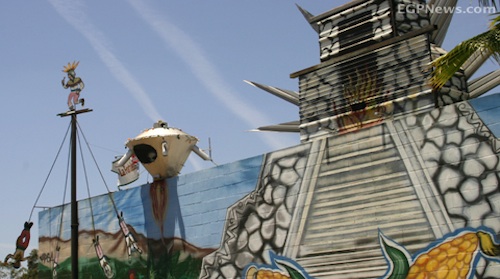‘La Fortaleza’ Means ‘Family’ At This Tortilla Factory

 By Gloria Angelina Castillo, New America Media/Eastern Group Publications
By Gloria Angelina Castillo, New America Media/Eastern Group Publications
A few years ago, she and her late husband, Ramiro Ortiz Rosales (Sr.), returned from vacation and found a towering temple paying homage to the Mexican Chichen Itza pyramid had been painted on an exterior wall of La Fortaleza Inc., their tortilla factory on North Ford Boulevard.
It seems it was not unusual for their oldest child David to surprise them with projects while they were away, Hermila told EGP. Today David is president of the family-owned business.
Over the years, the once vacant dirt lot with a heavily graffiti-marked wall has been transformed into something of a local landmark enjoyed by residents and commuters making the sharp turn off the Cesar Chavez exit of the 60 to 710 North freeway off-ramp.
“Indios Voladores de Papantla” (an ancient Mesoamerican ceremony still performed today), a woman making tortillas with a metate and comal (grinding stone and griddle), giant parrots, a UFO with an alien inside, and most recently an image of the God of Maize deity have been painted and a fountain installed at the location.
“Those were David’s ideas,” Hermila told EGP, jokingly adding he deserves all the credit.
The mural has gone up piece by piece over the last decade. David says he plans to expand the mural along the factory’s northern wall, where the 710-Freeway is being widened. He recalls how one year his sons spent Father’s Day plating bushes and plants to beautify the spot.
The mural’s beginnings were simple enough. Years ago, La Fortaleza had a graffiti problem, so the late Ramiro Sr. hired an artist to paint a mural along the Ford Boulevard side of the building to keep away vandals. It worked, but the southern wall continued to be hit by graffiti.
So David, with help from the factory’s employees, decided to create the image depicting the Chichen Itza temple, which today extends beyond the building’s roof. He found his inspiration during a trip to Cancun, Mexico, close to where the real temple is located.
“I am very proud of my ethnicity, I speak English and Spanish,” David told EGP. “Everyone has a chance, not like before,” he said, explaining he’s also proud of being American.
While East Los Angeles has a large concentration of Mexican immigrants, the mural has an educational component for multiple-generations of children who don’t have ties to Mexico and are unaware of their rich heritage, David said.
Ramiro Jr., the company’s vice president and David’s younger brother, says the graffiti stopped when David got involved.
“It adds to the community, I think they respect what he’s done back there,” Ramiro Jr. said. “It is our heritage. We are hard working people we have a long history. One of the greatest cultures ever was the Aztec culture and I think sometimes we forget that we come from a very distinguished background.”
They sometimes get the impression their third party inspectors see the mural as unprofessional, but Ramiro Jr. said “I think it’s a part of who were are, and of course, where we are.”
“People get off the freeway and yell, ‘I love it!’” David said.
The only complaint was taken care of years ago when a neighbor said the tortilla maker was too sexy, so he made his own tortilla maker to replace the original.
24-year-old Joseph Valdivia, an employee at La Fortaleza, grew up in the area and said the mural has been a part of the landscape for long as he can remember.
“It’s not something [people] see every day… There’s a spaceship on top of a tortilla factory!,” he explained, inviting people to come by and take a look.
The UFO is possibly the least stereotypical element of the mural in East LA, where Virgin Mary murals and Aztec Calendars are a more common theme. The UFO is made of an old metal machine and sits on the edge of the roof. La Fortaleza has engineered some of its own equipment, according to David.
The UFO is just one of several three-dimensional elements in the mural.
People often misunderstand it’s meaning, David said.
The alien and the UFO located near the temple are not meant to imply an alien civilization built the pyramids. “I say that’s nonsense, what the prehistoric cultures did is to be admired, and it rivals anything that is out there, the pyramids in Egypt or any other civilization,” Ramiro Jr. said.
There’s subtle political messaging, but it’s very subtle,” he explains.
The UFO element was added during the large immigration marches in downtown Los Angeles several years ago, he said. “Well, that’s an alien right? We’re all human beings,” David said, adding the term “illegal alien” is offensive.
They have the advantage of being a family-owned and run business that can set its own priorities and business atmosphere. For the Ortiz family, that means embracing their culture, not leaving it behind, and a willingness to work hard.
Four of the eight Ortiz children, sons and daughters of Mexican immigrants, currently run la Fortaleza. Their mother Hermila is from Jalisco, their father was from Nayarit. The couple met in the 1970s when they both worked at Ruiz Produce: Ramiro Sr. operated a small tortilla machine and Hermila was a cashier.
Ruiz Produce, at the time located at 1st Street and Gage in East LA was owned by Trinidad Rosales, who raised Ramiro Sr. as a single mother, according to the family.
“It was a small shop and they sold tamales, menudo, carnitas and tortillas to local residents,” Hermila said.
They moved twice as the demand for tortillas grew —to Whittier, and to Soto Street next to Roosevelt High School in Boyle Heights, buying out two failing family busineses (Guerrero and La Fortaleza) along the way — before buying the warehouse on Ford Boulevard where they’ve been headquartered for the last 15 years.
Their facility, where the historic Melmac Dishware sign still hangs above the silos, has been upgraded over the years.
La Fortaleza President David Ortiz created the mural with the help of his employees to deter graffiti and contribute to the community’s character.
While the Ortiz famiy did not choose the La Fortaleza name, which translates to “The Fortress” or “The Strength” they kept it because they liked it. It has taken on the meaning of “family” for them, according to Ramiro Jr.
La Fortaleza makes corn and flower tortillas, as well as tortilla chips. Ramiro Jr. estimates 250,000 bags of corn tortillas are made daily in the 24-hour facility. Corn tortillas are 80 perent of their products, though the company has also cooked up some unique creations for clients: Examples include bean, fish, garlic, Chia, nopal, chipotle and tomato basil flavored corn and flour tortillas.
“We are here to give our customer the best product possible, and our customer is the person who enjoys our product,” David said. “That’s what we are all working toward, to bring something to make people enjoy a meal—and that’s one of the great pleasures of life.
The factory has a small counter, manned by David’s uncle. However, because La Fortaleza caters almost exclusively to chain restaurants and wholesale distributors, they don’t really have a store, which is why Ramiro Sr. was never interested in using the factory’s walls for self-promotional murals, his sons said.
However, a flag with the La Fortaleza logo and Facebook symbols were recently added to the mural, reflecting a social media campaign launched by the company earlier this year. Other businesses in East Los Angeles are also trying to catch up with the use of social media, according to social media consultant Javier Guillen of goEastLos.
David says they care deeply for their 90 employees and are like a big family, even celebrating holidays together, such as the Guadalupe Torch procession, which in 2008 they had the honor of carry the traveling relic, David said.
He recalled how employees helped put out a fire that damaged part of their factory a few years ago, and how when his father passed away suddenly three years ago, the employees held a street procession with music, like they do in Mexico.
According to the family, their business’ success really comes down to keeping the labor intensive aspect of making traditional tortillas: cooking and grinding their own corn.
“I always tell them [my children] that they need to thank God that we are very blessed with work, and that it the most important thing: That we have work,” Hermila said, reflecting on how far the Ortiz family has come since first coming to the U.S.
“We never asked ourselves ‘when are we going to be rich?’ We always just wanted to work. And I tell them, do not be greedy, if it comes, good. It hasn’t come, but we have to be happy with what we have.”
This article was first published in New America Media.
[Photo courtesy EGP News]
